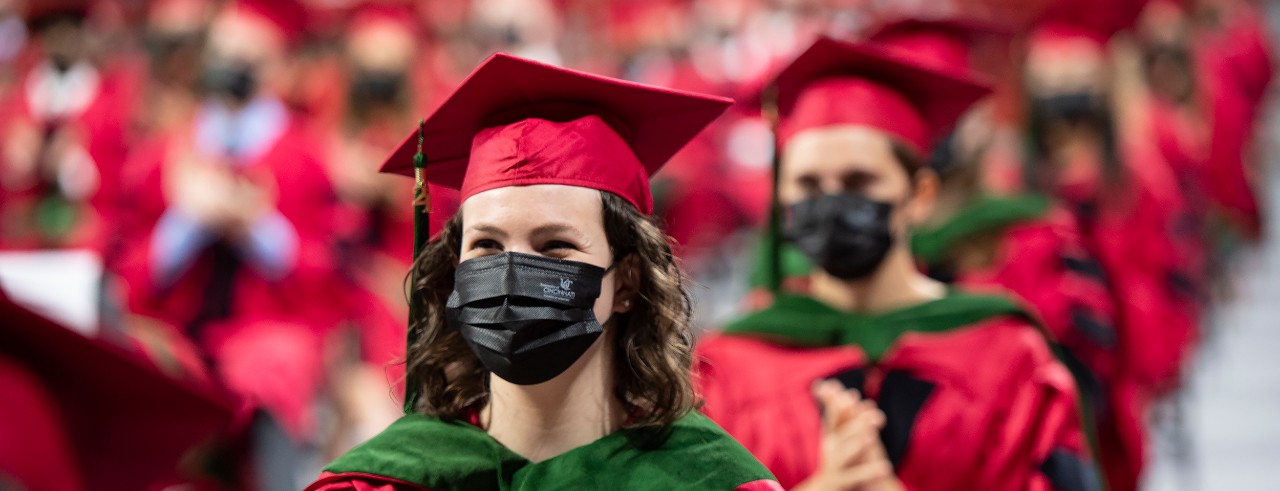
Pandemic created change forcing medical students to adapt and thrive
UC College of Medicine awards 176 medical degrees during Honors Day
Moms and dads snapped cellphone photos, offered congratulatory floral bouquets and carried signs welcoming a new doctor within their family. Husbands and wives, often with children in tow, cheered on spouses adorned in caps and gowns as they approached the stage.
Commencement, also known as Honors Day in the University of Cincinnati College of Medicine, had finally arrived for 176 individuals who received medical degrees, Sunday, May 23, in Fifth Third Arena. Masks and social distancing continued during the occasion as social interaction begins to again change as the COVID-19 pandemic eases its grip on daily life for many.
“The difficult challenges of the last year have dramatically changed what you envisioned for your last semester of medical school,” said UC President Neville Pinto, PhD.
He said medical students, faculty and colleagues across health professionals have put into action the words of Marie Curie, whom he quoted: ‘Nothing in life is to be feared. It is only to be understood. Now is the time to understand more, so that we may fear less.’”
“The pandemic has demonstrated clearly how yours is a profession that courageously seeks to conquer danger, uncover new knowledge, curve the unknown into the known, and curate hope and healing,” said Pinto. “Graduates, it fills me with tremendous pride knowing that our university has transfused you with an extraordinary education, one that has prepared you for whatever may lie ahead.”
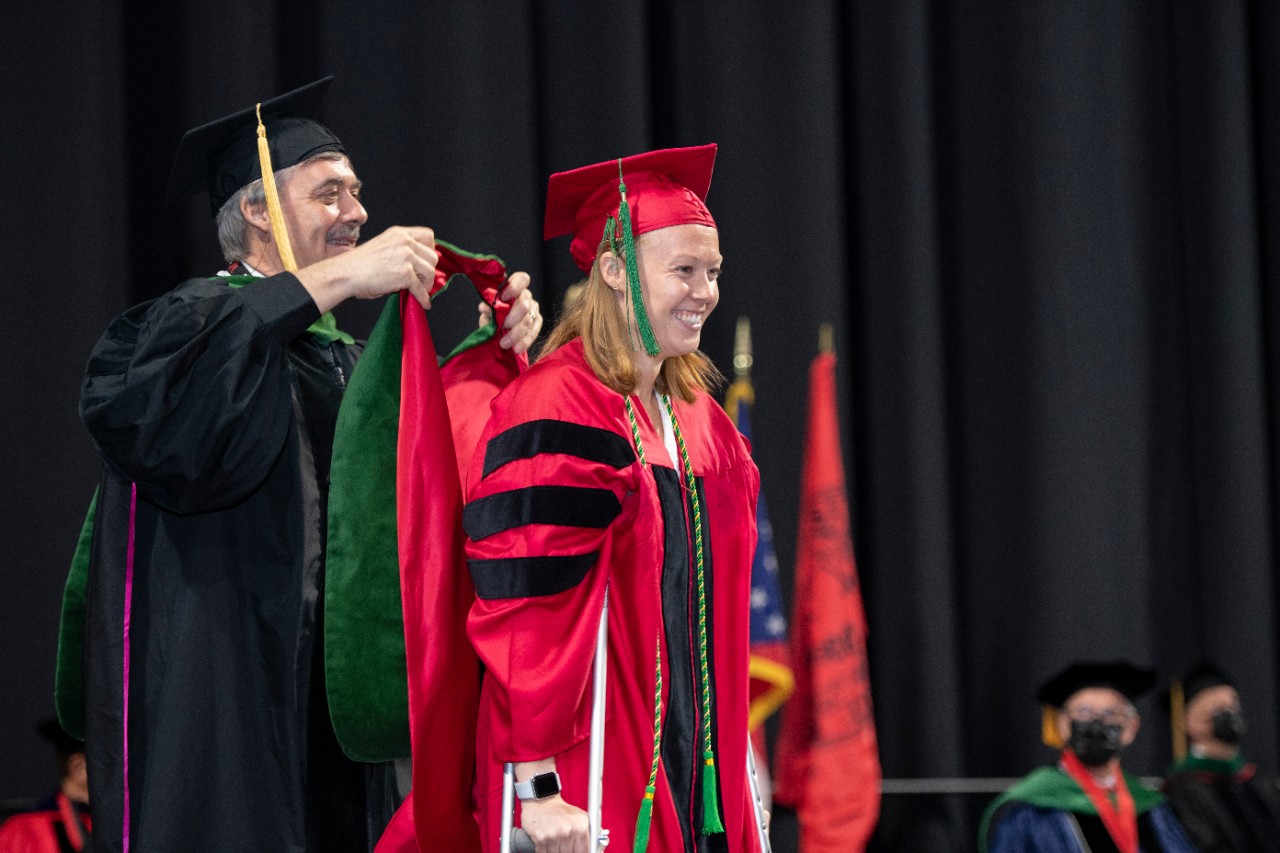
Philip Diller, MD, PhD, is shown hooding fourth-year medical student Alexandra Schoenberger during Honors Day 2021. Photo/Colleen Kelley/UC Creative + Brand.
Ronald Brown, chair of the UC Board of Trustees, offered congratulations on behalf of UC trustees, acknowledged the challenges so many faced during the pandemic and then thanked students for all they did to keep themselves and everyone else around them safe as they achieved a significant milestone.
“For our board, our number one priority is your success,” said Brown. “As a result we view this as a most important day in the life of the University of Cincinnati. We also see this day as a significant turning point not just for you but for our whole society. We wish you much success and look forward to the ways in which you will use what you have learned to make an impact, an impact in your personal life, your professional life and in the life of your community.”
Andrew Filak, MD, Christian R. Holmes Professor and Dean of the UC College of Medicine, told students the last 15 months of social distancing and isolation from families, friends, colleagues and fellow students made Honors Day even more special. It’s the first major event for the college since a medical student benefit concert was held in February 2020.
“It was shortly thereafter, in March, that many of our activities were shut down or altered as we were forced to respond to the incipient coronavirus pandemic,” said Filak. “It certainly does feel great to be together with all of you today. I hope that each one of you, our graduates, will reflect upon and thank those who have supported you and have been with you throughout your medical education.”
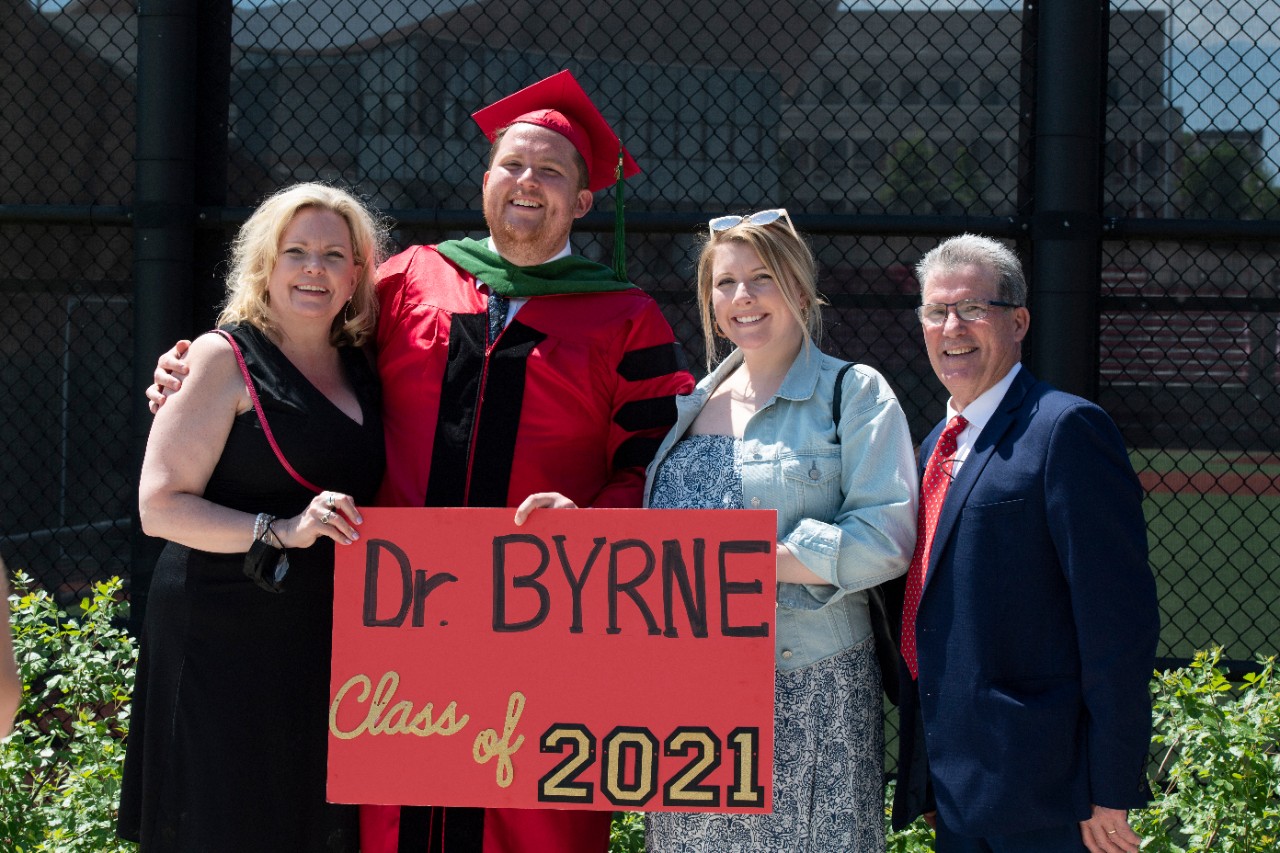
Fourth-year medical student Matthew Byrne is shown with his family during Honors Day activities at the UC College of Medicine. Photo/Colleen Kelley/UC Creative + Brand
“The past year has been extremely challenging on so many fronts,” said Filak. “And, with physician distancing requirements in place, with isolation and quarantines, we more than ever needed to maintain our social connections and to depend on those we love and care for and to support those we love and care for. I know that I share the sentiment of each of our graduates in offering our deep and enduring thanks to every member of our audience who has helped our students throughout their medical school education. There have been many heroes throughout this pandemic, and you are among them.”
Filak told graduates that they are receiving a medical degree when the world spotlight is sharply focused on physicians. The public is applauding and honoring healthcare professionals who are willing to place themselves in harm’s way to care for COVID-19 patients.
The pandemic also impacted graduates who have adjusted quickly to a learning environment that went from in-person, hands-on work to becoming primarily virtual.
“You studied from home,” said Filak. “You found ways to volunteer and serve your community. . . You found alternative ways of gaining clinical experience. Learning to don and doff personal protective equipment suddenly was the most important thing you need to learn. Your residency interviews were all online. None of this was predicted when you entered medical school. It was scary and it was challenging. But you managed. Not only that, you thrived.”
The pandemic may be a precursor of challenges that graduates will face as they enter medicine.

Mia Mallory, MD, hoods fourth-year medical student Sarah Smith as Philip Diller, MD, PhD, looks on. Photo/Colleen Kelley/UC Creative + Brand
“Each day in your career, you may well be confronted with something new — a disease you never diagnosed, a treatment you have never practiced, a problem you have never solved,” said Filak. “Medicine is about adjusting, and what you have learned during the pandemic and how you have responded have prepared you for whatever walks through your clinic door in the future. But no matter what the coming days bring us, it is imperative that you remember that it is not only how you treat patients, but how you treat your patients as people.”
Farzaan Kassam, a fourth-year medical student, delivered the class speech to his fellow graduates, echoing some sentiments from Filak.
“Medical school was difficult,” said Kassam. “There’s no denying that and while residency and our careers beyond likely won’t be any easier, our time in medical school has helped us learn how to better deal with hardship. Along the way, we learned that those things we value most will be accompanied by some form of struggle. But now we have a formula to overcome that struggle — dedication to our trade, consideration for others and a consistent effort to rest and recharge.”
Hooding of the doctor of medicine degrees were conducted by College of Medicine faculty: Aurora Bennett, MD, associate dean of student affairs; Mia Mallory, MD, associate dean for diversity, equity and inclusion; Philip Diller, MD, PhD, associate dean for educational affairs; Gurjit Khurana Hershey, MD, PhD, director of the Medical Scientist Training Program, and Kathryn Wikenheiser-Brokamp, MD, PhD, associate director or the Medical Scientist Training Program.
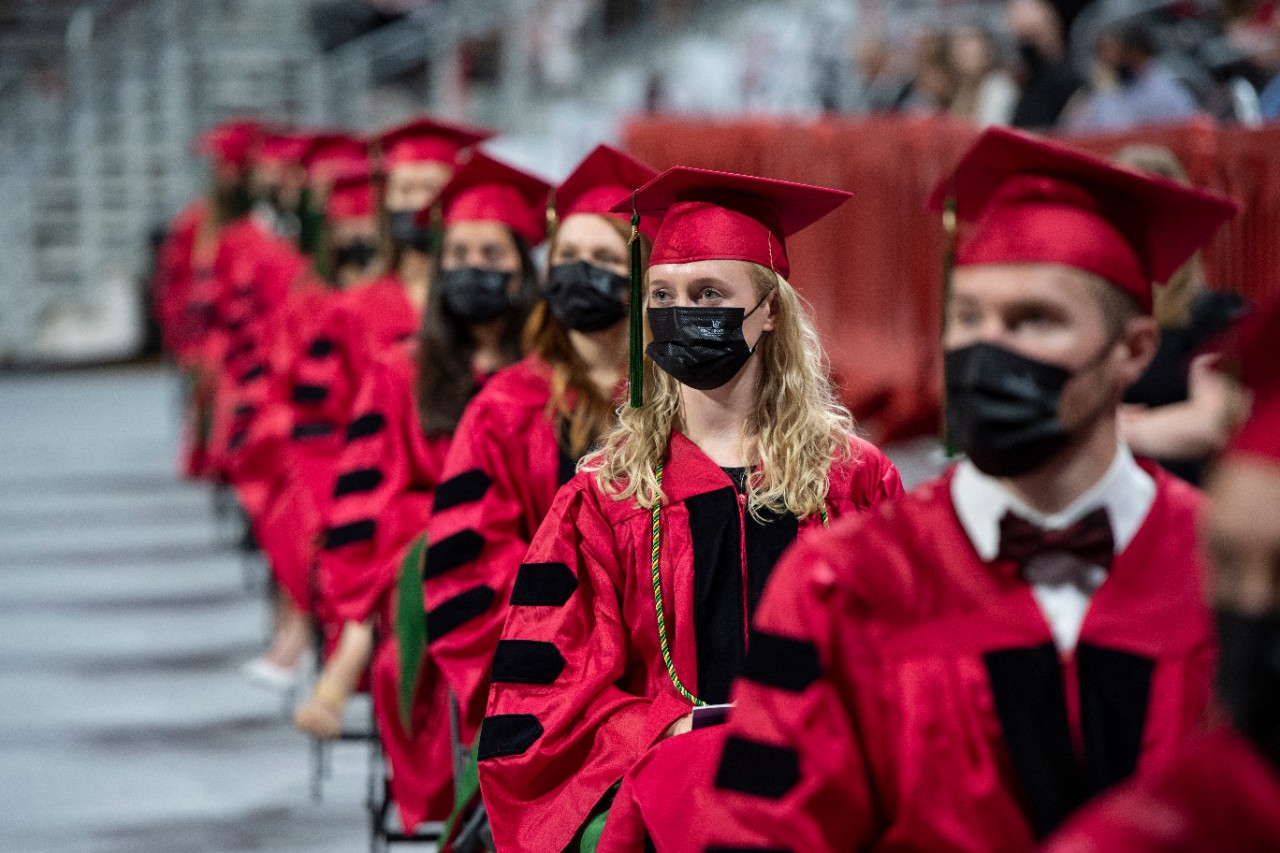
Medical students wait with anticipation at Honors Day activities in Fifth Third Arena. Photo/Colleen Kelley/UC Creative + Brand
During Honors Day, the College of Medicine recognized winners of the Daniel Drake Medal and recipients of the Leonard Tow Humanism in Medicine award.
The Daniel Drake Medal is given annually to living faculty or alumni for their outstanding and unique contributions to medical education, scholarship and research. This year’s recipients were William Barrett, MD, co-director of the UC Cancer Institute and professor and chair of the UC Department of Radiation Oncology; W. Brian Gibler, MD, professor in UC Department of Emergency Medicine; and Peter Stern, MD, professor in the UC Department of Orthopaedic Surgery.
The Leonard Tow Humanism in Medicine award is given to both a faculty member in the college and a graduating medical student in recognition of their demonstrating clinical excellence and outstanding compassion in the delivery of care and for showing respect for patients, their families and health care colleagues. This year’s recipients were Mallory and Alexandra Schoenberger, a fourth-year medical student.
Recipients of the Gold and Silver Apple Teaching Awards were also recognized. Matthew Kelleher, MD, assistant professor of pediatrics and internal medicine in the College of Medicine was the recipient of this year’s Gold Apple Teaching Award. Silver Apple Teaching recipients were Bruce Gebhardt, MD, professor in the UC Department of Family and Community Medicine and John Quinlan, MD, professor in the UC Department of Neurology and Rehabilitation Medicine.
Excellence in Mentoring Award recipients, Kelleher and Bi Awosika, MD, associate professor in the UC Department of Internal Medicine, were also recognized during Honors Day. Filak in concluding his remarks reminded graduates that they will always be part of the College of Medicine.
“You each have the potential to change the world,” Filak told graduates. “It could be by discovering a cure or unlocking the mystery of the disease. Consider how you can change the world of each patient each day. Every patient encounter brings you the opportunity to impact their life, and the lives of their family. What a wonderful gift that is, and we, your future patients, are so extraordinarily fortunate that you will be caring for us in the upcoming years. Your family and friends and all of us here at the College of Medicine will always be with you to support you throughout your career.”
If you missed Honors Day you can listen to the day’s events online.
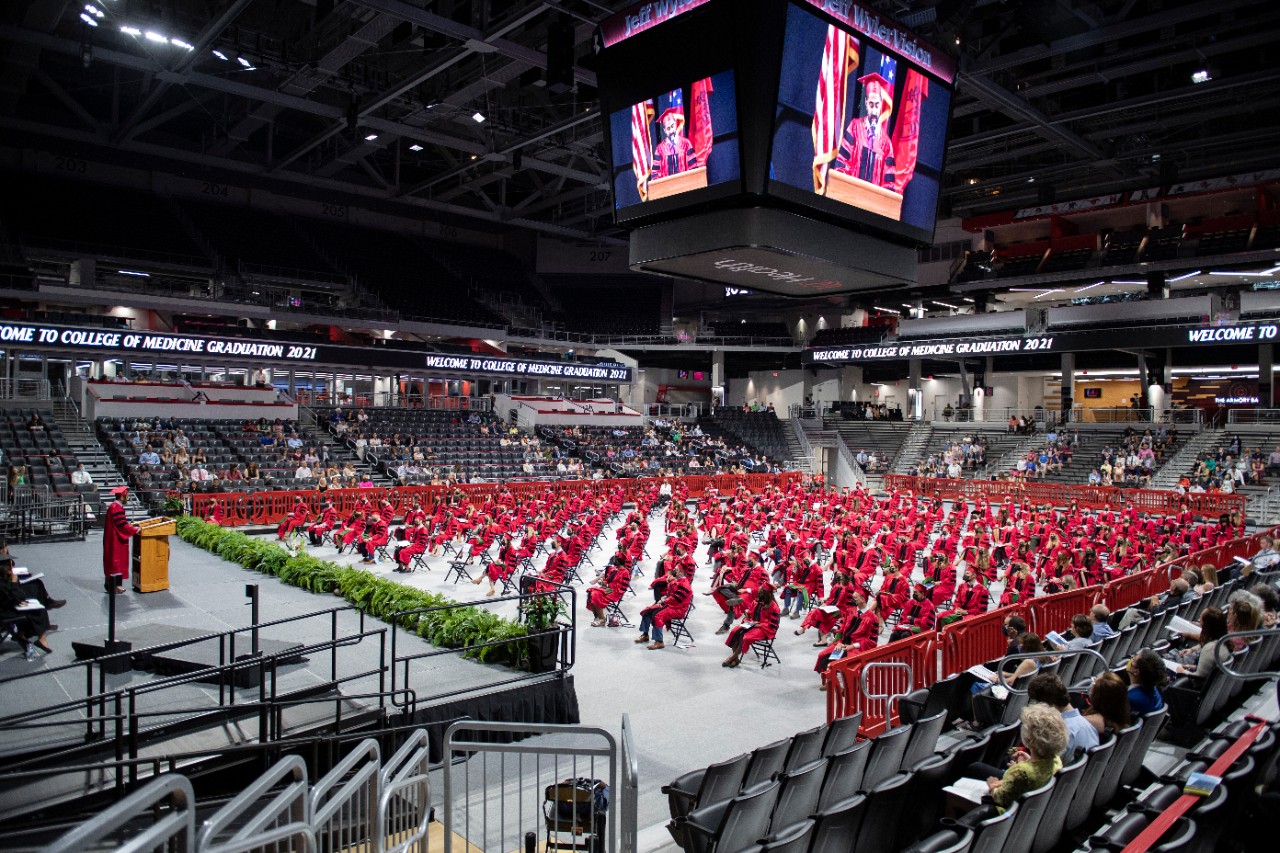
View of Fifth Third Arena during Honors Day 2020 for the UC College of Medicine. Photo/Colleen Kelley/UC Creative + Brand
Impact Lives Here
The University of Cincinnati is leading public urban universities into a new era of innovation and impact. Our faculty, staff and students are saving lives, changing outcomes and bending the future in our city's direction. Next Lives Here.
Stay up on all UC's COVID-19 stories, or take a UC virtual visit and begin picturing yourself at an institution that inspires incredible stories.
Related Stories
Doctors prepare for surgeries with 3D-printed organs
April 11, 2025
Meteora3D, a Venture Lab-backed startup, helps surgeons better understand upcoming procedures by designing and developing quick-to-produce, 3D-printed anatomical models.
CCM Jazz Orchestra Celebrates the Big Band Genius of Ray Charles
April 11, 2025
The University of Cincinnati College-Conservatory of Music (CCM) invites audiences to experience a powerful tribute to a music icon with the Big Band Genius of Ray Charles, performed by the CCM Jazz Orchestra under the direction of Eric Lechliter.
UC recaptures national championship in disc golf
April 10, 2025
The University of Cincinnati’s “Discats” won the national disc golf championship for the second time in three years.
